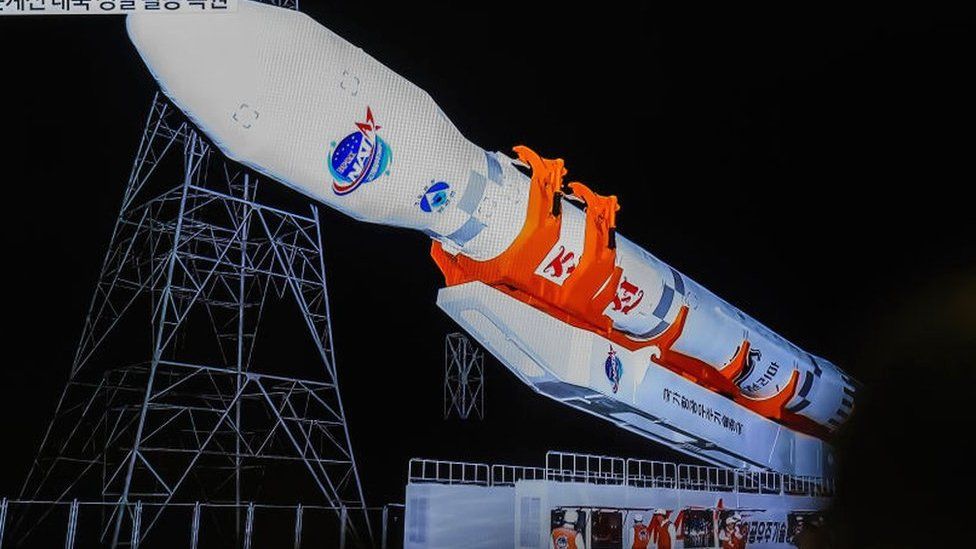North Korea fully suspends military pact with South
- Published

North Korea has ripped up a five-year-old deal with Seoul aimed at lowering military tensions, in the latest escalation of a row between the two.
It all started when Pyongyang claimed to have successfully launched a spy satellite into space on Tuesday.
This led to South Korea part suspending the agreement, saying it would resume surveillance flights along the border.
Pyongyang is now vowing to fully suspend the pact and send stronger forces and equipment to the border.
"From now on, our army will never be bound by the September 19 North-South Military Agreement," it said in a statement.
It promised to withdraw all measures "taken to prevent military conflict in all spheres including ground, sea and air", and deploy "more powerful armed forces and new-type military hardware" in the border region.
Pyongyang fired a rocket believed to contain its Malligyong-1 spy satellite late on Tuesday and hailed the launch as a "success".
South Korea's military later confirmed that the satellite had entered orbit but said it was too soon to tell if it was actually functioning.
Seoul strongly condemned the launch - and on Wednesday morning top officials agreed to immediately restart surveillance operations along the border, which would allow the South to monitor North Korean outposts and long-range artillery.
That is a breach of a no-fly zone established under the Comprehensive Military Agreement in 2018 - signed by both nations' leaders in an attempt to de-escalate tensions between their two countries and prevent a conflict erupting.
But North Korea has violated the pact multiple times over the past two years, by launching missiles and firing artillery rounds into the sea in the South's direction. Last December, it sent drones across the border into South Korea, with one flying as far as the capital Seoul.
This was part of Seoul's justification to scrap parts of the agreement - that the North was already not abiding by it.
Some analysts therefore argue that Pyongyang officially withdrawing from the deal might not make much of a difference.
"Because North Korea was not adhering to the agreement in the first place, the possibility of limited collision has always been there", said Jo Bee Yun of the Korea Institute for Defence Analysis.
Though both sides are blaming each other for escalating tensions and threatening to retaliate, Jo Bee Yun called this a "political tit-for-tat" that would not necessarily result in a "physical military collision".
The outcome will likely depend on what action the North now takes.
Chun In-bum, a retired South Korean Army lieutenant general, said the North would want to "make life as difficult for the South as the South makes it for them". He predicted that they will start by displaying artillery along the border, and by flying more drones, possibly into South Korean territory.
South Korea's defence minister Shin Won-sik warned earlier that if the North used the suspension as an excuse to carry out provocations, Seoul would "immediately and firmly punish it to the end." He said he would be monitoring the North's behaviour and discussing what counter measures to take with President Yoon Suk-yeol, when he returns from his trip to the UK.
Pyongyang insists the launch of the spy satellite is part of its "right to self-defence" - but it has been strongly condemned by South Korea, the US and Japan.
Developing a functioning spy satellite is a major part of North Korea's five-year military plan, set out by its leader Kim Jong Un in January 2021.
The technology could in theory enable Pyongyang to monitor the movement of US and South Korean troops and weapons on the Korean Peninsula, allowing it to spot incoming threats. It would also allow the North to plot its nuclear attacks with more precision.
North Korean state media has claimed the country's leader Kim Jong Un is already reviewing images of US military bases in Guam sent by the new satellite. The BBC has not verified this.
- Published22 November 2023
- Published22 November 2023